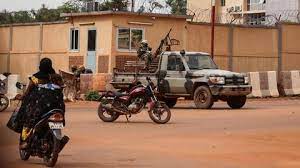The overthrow of the head of the military junta in Burkina Faso, Lieutenant Colonel Paul-Henri Sandaogo Damiba, reflects deep divisions in the army, according to Senegalese political analyst Alioune Tine.
Damiba finally resigned on Sunday 2 October.
Eight months after his arrival in power by force, he was the victim of a coup perpetrated by 34-year-old Captain Ibrahim Traoré, the new leader of the Patriotic Movement for Safeguard and Restoration (MPSR, the name of the junta).
He refused to countenance losing power as some soldiers remained loyal to him.
The suspense lasted several hours before he gave in following negotiations led by religious and local authorities.
However, Traore’s coup, the second in Burkina Faso this year symbolises “the division of the army in the struggle for the control of state power,” explains Alioune Tine, a prominent figure in West African civil society and founder of the think tank Afrikajom Center.
“Burkina avoided a catastrophe, with a scenario of hallucinating chaos where the two military leaders and their supporters were face to face in a context of particularly tense rivalry with fake news, misunderstandings, confusions and above all an absurd inter-imperialist proxy war, with violent demonstrations of the population in the streets of Ouagadougou,” says the former regional director of Amnesty International for West and Central Africa.
According to Tine, the division within the Burkinabe army does not bode well in the fight against the jihadist insurgency.
It is characterised by the blockade of the town of Djibo (north) by armed Islamist groups, exposing the inhabitants to the threat of famine.
“The context of the security crisis, exacerbated by recurrent attacks on civilians and the army, which aggravates the deep humanitarian crisis and the threat of famine, of which Djibo is tragically the symbol, must lead the Burkinabe military and the civilian population to work towards the unity of the army, discipline and patriotism in order to effectively engage in solidarity and coordination against terrorism, which is threatening to topple Burkina Faso,” he adds.
“The division of the army and the population is a factor of exacerbation of vulnerabilities and fragilities that could constitute a threat to the survival of the Burkinabe state. This situation would be a godsend for the Islamic State in the Great Sahara (EIGS) and the Groupe de Soutien à l’Islam et aux Musulmans (GSIM), which dream of attacking the country’s few secure sanctuaries, including the capital Ouagadougou,” Tine says.
ODL/cgd/lb/as/APA


